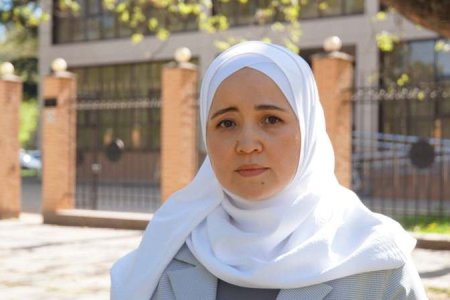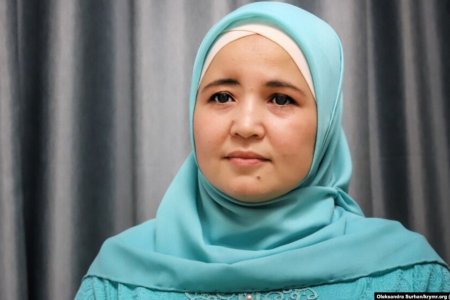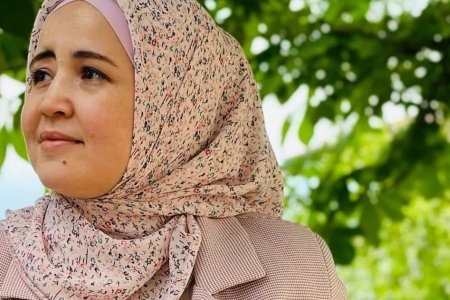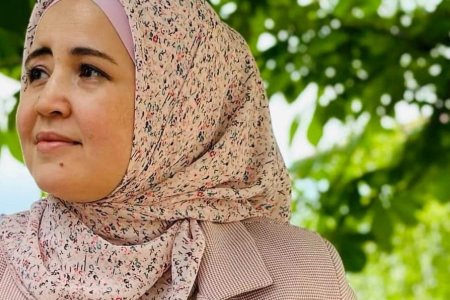
In a new escalation of persecution against Lutfiye Zudiyeva, Russia has added the courageous journalist and coordinator of the vital Crimean Solidarity human rights movement to its register of so-called ‘foreign agents’. The move is very clearly aimed at silencing a person who has tirelessly spoken out in defence of political prisoners and has helped ensure that the world learns of the mounting repression and violations of human rights in occupied Crimea.
In Orwellian fashion, Russia’s justice ministry claimed, in its announcement on 16 May 2025, that Lutfiye Zudiyeva had “circulated false information about decisions taken by the public authorities of the Russian Federation and the policies they carry out; taken part in circulating notifications and material of a foreign agent to an unlimited number of people. She received support from foreign sources and is acting in cooperation with foreign organizations.”
Lutfiye commented that “using labels against people, calling them ‘a foreign agent’, ‘an extremist’’, ‘a terrorist’ is very much in the spirit of our times when laws turn into instruments of political repression. There is nothing new in this and, unfortunately, nothing unexpected.
As before I think that the struggle for justice almost always means to go against the tide. This is not about accepting rules foisted on you or somebody’s agenda. It is about the choice that at some point you make and to which you remain true.
From tomorrow I will have to accompany each post with a discriminatory note about the foreign agent [label]. However, if one must choose between that and silence – silence about lawlessness; searches; fabricated prosecutions, I choose to not be silent.”
Graty, the vital publication which Zudiyeva often writes for, reports that the journalist is planning to appeal against the Russian justice ministry’s ‘foreign agent’ designation. The Graty editorial office condemn the label “as inadmissible pressure on a journalist who is providing objective coverage of the Russian authorities’ repressive practice in Crimea.”
Zudiyeva notes that those behind the decision are trying to present her as being “a carrier of foreign influence” which she totally denies. She writes journalist material and defends human rights entirely consciously. It is, as she puts it, her adult choice, as Crimea is her home. She points out that many of those whom Russia is designating ‘foreign agents’ are people who carry out investigations or provided justified criticism of the regime. The information that they circulate is inconvenient because it clashes with the official position. Labelling a person a ‘foreign agent’ helps to restrict the person’s activities and is also an attempt to discredit journalists and human rights activists in the public eye, she says.
Russia’s ‘foreign agent’ law also places extremely onerous demands on the person who must provide regular accounts of all their financial matters. There are a number of other restrictions, including a ban on educational activities with people under 18 or on work in state (in Crimea, Russia occupation) educational organizations. Russia is also overtly using the ‘foreign agent’ label as a weapon against those few print or Internet media that have survived. These, and their editors, have faced crippling fines for material online which does not mention that the source of information has been labelled a ‘foreign agent’. It does not matter that the organization in question was labelled a ‘foreign agent’ after the publication, or individual, posted or reposted it.
Russia’s original ‘foreign agent’ bill dates back to 2012 and was condemned even then as yet another weapon aimed at crushing civil society. It initially targeted only NGOs but was later broadened to so-called ‘media foreign agents’, with this used, for example, against Crimean Realities, the Radio Liberty project which filled a vital gap after Russia eliminated all free media in occupied Crimea. In December 2019, Russian leader Vladimir Putin signed into force a law making it possible to label virtually any journalist, blogger or civic activist a ‘foreign agent’. They could, for example, be so designated for having circulated Crimean Realities material, for having taken part in preparing it, or for receiving money or assets from abroad, or from Russian legal entities receiving foreign funding.
Russia’s persecution of Lutfiye Zudiyeva began back in 2019, two months after Russia’s most open attack on Crimean Solidarity with the arrests and subsequent huge sentences against 25 Crimean Tatar civic journalists and activists. On 30 May 2019, she was detained, together with Mumine Saliyeva, another Crimean Solidarity human rights activist and wife of political prisoner Seiran Saliyev. The detention of two women, both of whom have young children, seemed a clear threat that women could also become direct targets of repression. On that occasion, she was held prisoner for several hours, with lawyers prevented from seeing her. She was then brought before an occupation ‘court’ and fined over three Facebook posts which she had nothing to do with, but which somebody else had tagged her on when posting five years earlier.
On 27 July 2023, Zudiyeva and another journalist were illegally detained, together with 12 other Crimean Tatars for trying to attend a purportedly open court hearing into the appeal against the appalling sentences passed on Crimean Tatar Mejlis leader, journalist and human rights defender Nariman Dzhelyal and two cousins, Asan and Aziz Akhtemov. She was fined on a preposterous charge of having taken part in an unauthorized mass event, with the occupation ‘judge’, like the Russian-controlled ‘police’, ignoring the fact that she had been there as a journalist.
On 22 February 2024, armed Russian enforcement officers burst into Zudiyeva’s home in Dzhankoi, carried out a search for which they did not have a proper warrant, and took Lutfiye to the Simferopol department of the ‘centre for countering extremism’ where two administrative charges were laid. These were over three posts on Facebook. In two of them, the journalist had mentioned or posted material mentioning Radio Liberty without indicating that this has been forcibly registered as a so-called ‘foreign agent’ in Russia and on occupied territory. In the third text, The earliest of the posts dated back to 10 January 2021It and reported on various measures throughout local Crimean Tatar communities in support of three political prisoners – Enver Omerov (then 59), his son Riza Omerov and Aider Dzhapparov. The second, posted on 16 February 2022, reported the internationally condemned sentence against Vladyslav Yesypenko, a Ukrainian freelance journalist who was seized, tortured and then ‘sentenced’ to 6 years on surreal charges while carrying out work in occupied Crimea for Crimean Realities. The third was from 6 August 2022 and was about Russia’s offensive against three Crimean Tatar lawyers, all involved in defending Crimean Tatar political prisoners - Lilia Hemedzhy; her husband Rustem Kyamilev and Nazim Sheikhmambetov.
The charges and ‘convictions’ were surreal, with Lutfiye fined, for example, over something called ‘abuse of freedom of mass information’ under Article 13.15 § 2.1 of Russia’s administrative code. The so-called abuse was purportedly because a post on her Facebook page had not mentioned that Russia calls Radio Liberty a ‘foreign agent’.
Lutfiye Zudiyeva is one of many Crimean Tatar public figures who standardly receive so-called ‘warnings of the inadmissibility of extremist activities’ on the eve of important dates for Crimean Tatars and / or all Ukrainians. It may well be no accident that Russia chose two days before the anniversary of the Deportation of the entire Crimean Tatar people in 1944 to announce the ‘foreign agent’ decision.



